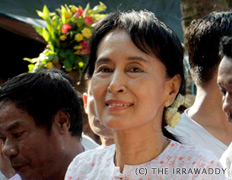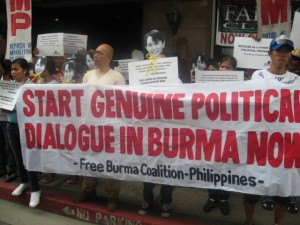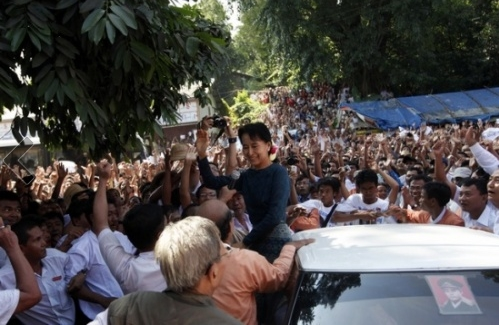
News about Daw Aung San Suu Kyi
Since her release on 13 November 2010, Daw Aung San Suu Kyi has proven that she continues to be a powerful force for social and political progress in Burma.
Follow her efforts to promote human rights, social development, democracy and national reconciliation in Burma in the following articles about her work, her words, and her long-awaited release.
Posts about ‘Daw Aung San Suu Kyi’
Clarification
In the morning news of November 25, 2010, broadcast by Radio Free Asia, it was stated that Daw Aung San Suu Kyi did not endorse the attempts made overseas to bring the Generals of the Junta to the international criminal court for crimes against humanity by quoting the November 23 issue of the New York Times […]
| |Human rights: Burma, Iraq, Tibet
MEPs welcome the recent release of Burmese opposition leader Aung San Suu Kyi but are concerned about her safety and insist that her freshly regained freedom must be unconditioned and unrestricted. They urge the Burmese regime to engage in discussions with her and with representatives of the minority peoples […]
| |Daw Aung San Suu Kyi Speaks with Amnesty International
On 24 November, Daw Aung San Suu Kyi spoke via telephone with Amnesty International Malaysia, and answered some questions from youth activists from the Asia-Pacific region. She called on youths abroad to continue to campaign for the release of all of Burma’s political prisoners, and raise awareness about human rights violations in the country. Daw Aung San Suu Kyi also spoke about increasing communication between youths inside Burma and abroad, and maintaining pressure on all ASEAN countries to help bring genuine democracy to Burma. Listen to the interview here.
| |AAPP urges the international community to keep the spotlight on Burma’s 2,203 other political prisoners
Ten days after the release of Daw Aung San Suu Kyi, the Assistance Association for Political Prisoners urges the international community to keep the spotlight on Burma’s 2,203 political prisoners who remain in prison. The international community must unite in a concerted effort to campaign for the release of all political prisoners […]
| |DASSK’s Freedom, Development, and Human Worth
As the world has been watching Burma with the renewed interest since the release of Daw Aung San Suu Kyi, it is important to recall her ideas and perspectives on promoting democracy, development and human rights in Burma and other third world countries – some of what makes her such an important leader […]
| |“The Military Regime’s Merciless Act of Making the People Living with HIV/AIDS in Burma Helpless and Homeless Denounced”
The U.S. Campaign for Burma (USCB), a Washington DC-based organization campaigning for freedom, justice and democracy in the Southeast Asian country of Burma, denounced today the military regime for its threat to drive out the people living with HIV/AIDS from the shelter provided to them by members of the National League for Democracy (NLD), led by Nobel Peace Prize Recipient Daw Aung San Suu Kyi […]
| |Activists urge Burmese junta to start genuine dialogue with opposition; reiterate rejection of 2010 polls
 Filipino solidarity activists, mostly women, under the Free Burma Coalition – Philippines (FBC-Phils) today held a rally in front of the Burma (Myanmar) embassy to welcome the release from house arrest of Burma’s democracy icon Daw Aung San Suu Kyi […]
Filipino solidarity activists, mostly women, under the Free Burma Coalition – Philippines (FBC-Phils) today held a rally in front of the Burma (Myanmar) embassy to welcome the release from house arrest of Burma’s democracy icon Daw Aung San Suu Kyi […]
More Steps Needed for Genuine Democracy and Reconciliation in Burma
The Asian Forum for Human Rights and Development (FORUM-ASIA) celebrates with the rest of the world the return to freedom of Aung San Suu Kyi, with the end of her house arrest on 13 November. Aung San Suu Kyi is an important symbol not only to the people of Burma, but to all Asians struggling for democracy through peaceful means against military and authoritarian rule. Her steadfastness in struggle, despite the military regime’s attempts to silence and imprison her for 15 of the past 21 years, has been nothing less than inspirational for human rights defenders across the region […]
| |PFOB Chair Decries Absurd Election Complaint Fees and Calls on the Military and its Proxy Party to Protect Aung San Suu Kyi
It is absurdly difficult to make a complaint about the recent sham elections in Burma orchestrated by the military and their party USDP. To make a single complaint costs about 5 times your annual income. And if the complaint is determined to be unfounded, you can be fined about 15 times your annual salary. “This is absurd” said PFOB Chair the Honourable Larry Bagnell M.P. Yukon […]
| |Daw Aung San Suu Kyi’s Long Awaited Release Brings Unity and Hope
 Daw Aung San Suu Kyi’s emergence from house arrest following the expiration of her wrongful detention sentence has caused a ripple effect across Burma’s political scene. Unable to keep the democracy leader under detention any longer according to their own laws, the regime’s inability to manipulate the political environment in this situation has brought about a greater potential for political change that their fraudulent elections ever did.
Daw Aung San Suu Kyi’s emergence from house arrest following the expiration of her wrongful detention sentence has caused a ripple effect across Burma’s political scene. Unable to keep the democracy leader under detention any longer according to their own laws, the regime’s inability to manipulate the political environment in this situation has brought about a greater potential for political change that their fraudulent elections ever did.









 All posts
All posts